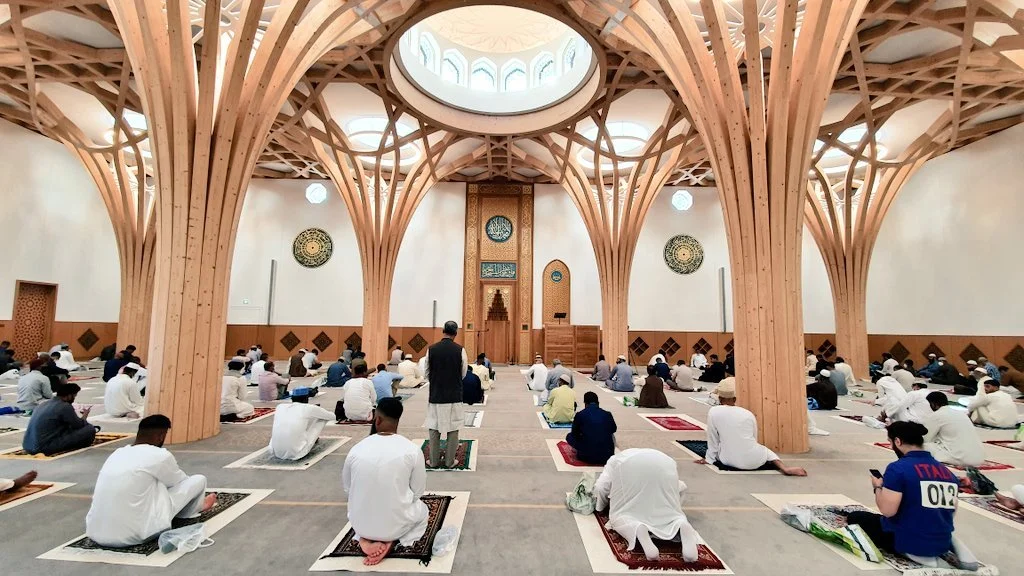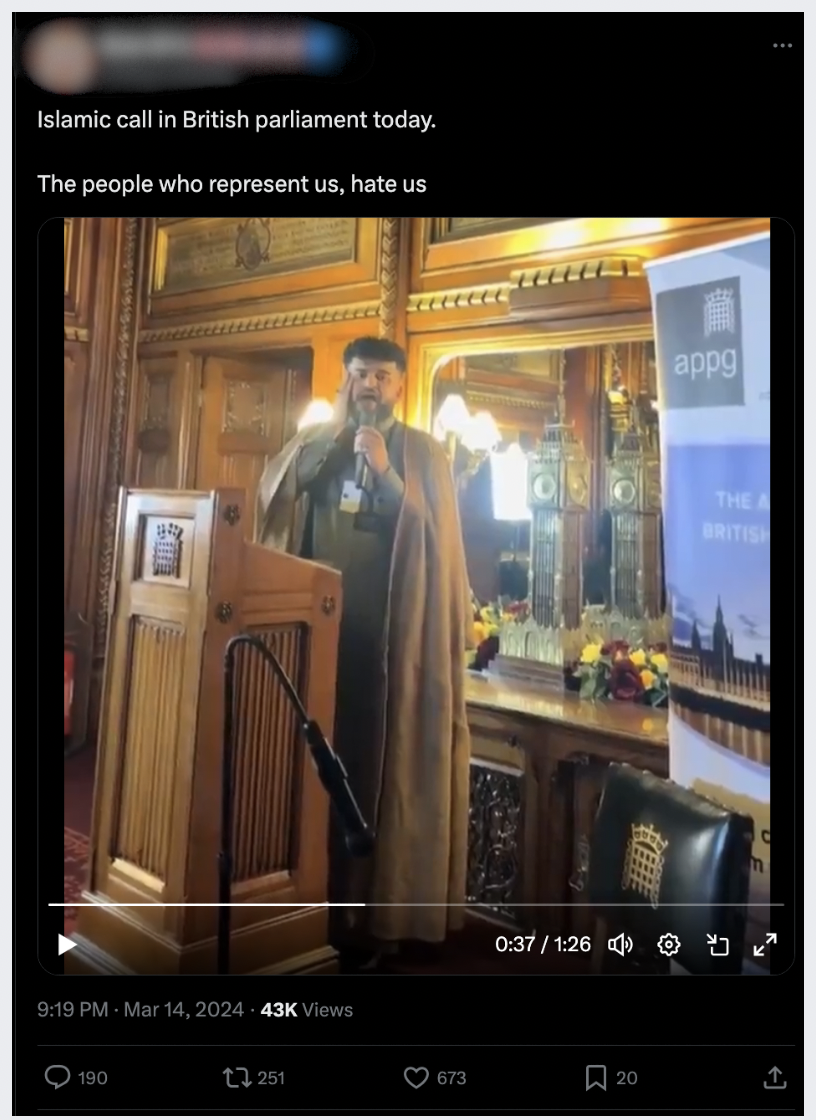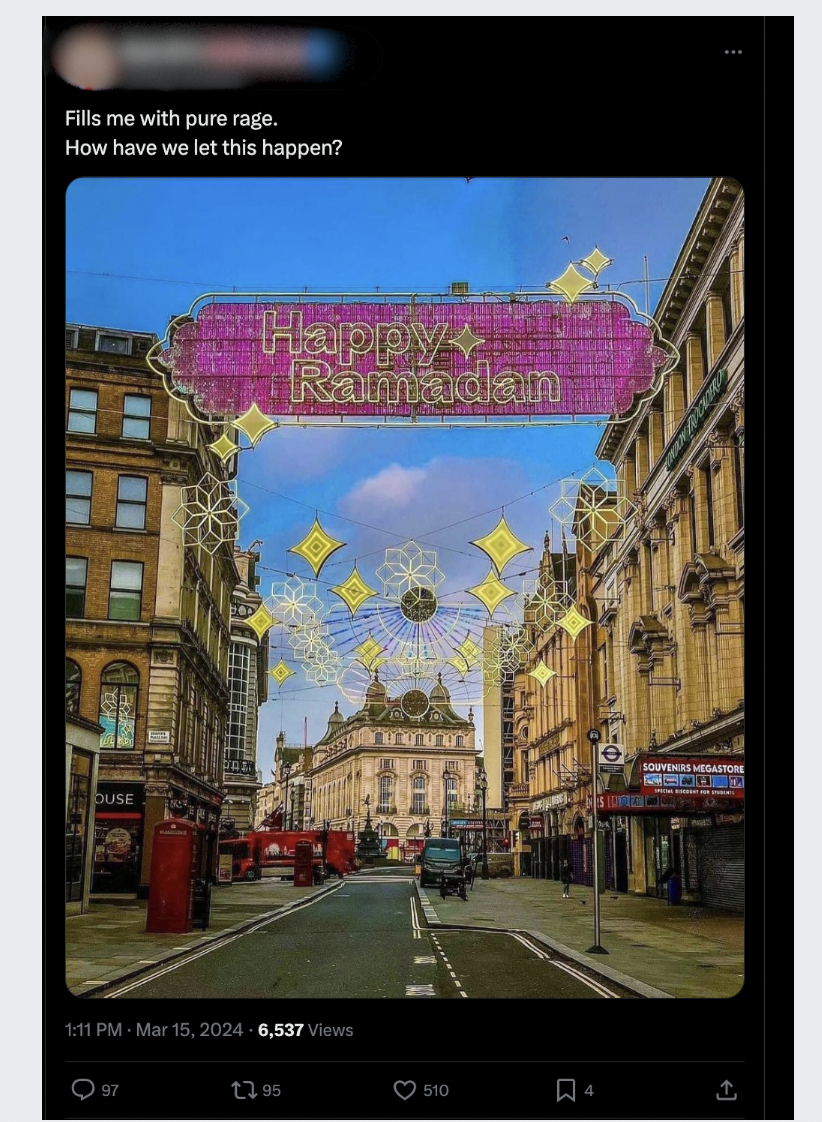Navigating Hate During Ramadan: My Personal Journey
This article delves into the experience of anti-Muslim hate during Ramadan. It explores what is Ramadan, its impact on the Muslim community and strategies for combatting prejudice. The article sheds light on the urgent need to address online and offline hate speech against Muslim communities.
Photo credit: Muslim Council of Britain annual report
What is Ramadan?
Ramadan is the ninth month of the Islamic lunar calendar. It’s considered the holiest month for Muslims all over the world. It’s a month dedicated to fasting, spiritual reflection, increased devotion, and charitable acts. Fasting is one of the Five Pillars of Islam, which are five rules considered obligatory for all Muslims. During Ramadan, Muslims must fast from dawn to sunset, without food or drink.
Muslims come together to break their fast at local mosques and engage in special prayers known as Tarawih, which are unique to this sacred month. Unfortunately, community gatherings during such nights can attract hate with Muslims becoming targets as they are more visible at this time. During Ramadan, there is an increase in online hate and prejudice, which can manifest itself as real-life violence and discrimination against the Muslim community.
Misconceptions and Stereotypes Towards Muslims
Misconceptions surrounding Ramadan often fuel anti-Muslim sentiment. One prevalent misconception is that Muslims are coerced into fasting during this holy month. However, Ramadan is not solely about abstaining from food and drink; it encompasses prayer, self-reflection, charitable acts, and community involvement. Viewing fasting as oppressive can breed resentment and hostility towards Muslims. It's crucial to recognize that fasting is not exclusive to Islam; Christians observe Lent, and Jews observe Yom Kippur. Despite this, criticism towards fasting practices is disproportionately directed at Muslims.
Photo credit: MEND Report
Additionally, Ramadan is sometimes wrongly associated with violence or extremism, often fuelled by misrepresentations in conservative media or actions of extremist groups during this time. It’s crucial to understand that these individuals do not represent the peaceful majority of Muslims worldwide, who dedicate themselves to spiritual growth and fasting during this sacred month. For example, there are problematic platforms that distort and track violence during Ramadan, calling it ‘Ramadan Bombathon’. They compare incidents of violence by extremist groups to other religions and right-wing groups, often showing zero incidents for them. This unfairly paints Ramadan as a violent time, ignoring the peaceful practices of most Muslims. It spreads fear and divides communities.
During Ramadan, Muslims often face increased suspicion, hostility, and discrimination, manifesting in hate speech, mosque vandalism, and physical assaults. A report by the Muslim Census and MEND found that 42% of mosques in the UK experienced religiously motivated attacks in the past three years, with 17% reporting physical abuse towards worshippers or staff during the month of Ramadan. For instance, in April 2022, worshippers in East Ham Mosque were ‘attacked by [a] group armed with bottles and hockey sticks’ during iftar, highlighting the concerning trend of violence during this sacred month.
In summary, misconceptions surrounding Ramadan contribute to anti-Muslim hate, fostering negative attitudes and prejudice. These false beliefs, such as linking Ramadan with violence, divide communities and increase discrimination against Muslims. It's crucial to challenge these misconceptions and support Muslim communities to promote inclusivity and understanding.
Photo credit: X. Snapshots of Anti-Muslim hate speech found on X during Media Monitoring in March 2024.
The Toll of Online Anti-Muslim Hate Speech During Ramadan
As a Media Monitor and Muslim individual, I've observed a troubling surge in anti-Muslim hate speech online, particularly exacerbated during Ramadan. Social media platforms such as X and Facebook serve as breeding grounds for right-wing groups to disseminate false narratives and stereotypes about Islam, contributing to a climate of intolerance.
During Ramadan, this phenomenon becomes more pronounced. For instance, a tweet on X condemning Central London's Ramadan lights on Oxford Street garnered over 500 likes, with users engaging in hateful discourse. Similarly, public figures like journalist David Atherton contribute to the spread of anti-Muslim sentiment, as evidenced by his tweet mocking women wearing hijabs during Ramadan.
As a Muslim, witnessing the proliferation of such hate speech is distressing. It not only impacts our emotional well-being but also perpetuates harmful stereotypes, creating a climate of fear and insecurity during Ramadan and beyond. This online rhetoric fuels broader societal divisions and intolerance, making it imperative for platforms to address hate speech effectively.
Moreover, as someone who monitors social media platforms, being a Muslim adds another layer of dismay. It evokes memories of enduring anti-Muslim hostility, particularly during my younger years wearing the hijab. Vans would drive by hurling derogatory slurs, a common experience for many Muslims in the UK.
During Ramadan in 2017, heightened tensions due to terror attacks in the UK were compounded by hateful anti-Muslim discourse online. As a 17-year-old at the time, the impact of such online hate made navigating life as a Muslim in the UK even more challenging. It fostered discrimination and perpetuated harmful stereotypes, leaving me feeling alienated and fearful in my own country.
(Photo credit: Teeside Live)
During Ramadan, Muslims often face increased suspicion, hostility, and discrimination, manifesting in hate speech, mosque vandalism, and physical assaults.
Combating Anti-Muslim Prejudice
Each of us has a crucial role in combatting hate in all its forms, irrespective of ethnicity, religion, or any other diversity category. Hate, in any manifestation, is unjustifiable. It falls upon each of us to prevent the nurturing and expression of hate, whether it manifests verbally, physically, online, or offline towards others. Numerous means and resources exist to educate oneself and contribute to the fight against anti-Muslim prejudice. Below are just a few suggestions and materials as a starting point:
1. Educate yourself on the challenges Muslims in the UK face.
3. Familiarise yourself with the rhetorical devices used in anti-Muslim hate speech so you or others around you do not replicate them.
4. Get acquainted with common anti-Muslim narratives often spread and upheld by the media so that you don’t spread such sentiments!






